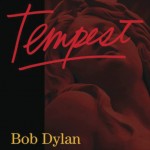
The saga starts with a man on a train passing through Carbondale, Illinois, riding home on the City of New Orleans. It ends at the grave of John Lennon in the night-shrouded forest, telling us to “cover him and let him sleep.” It reminds me of Mark Twain or maybe a one-hour, eight-minute version of “Desolation Row.”
“Anything goes and you just gotta believe it will make sense,” Bob Dylan said of his 35th studio album Tempest, released on September 11 in America. He’s 71 years old and since 1997 has produced five albums that are as much meant to be read as heard.
| [iframe src=”https://embed.spotify.com/?uri=spotify:album:3uIkl8RFCDyYAJKF5X46XK” width=”300″ height=”380″ frameborder=”0″ allowtransparency=”true”] |
| Buy Tempest on iTunes |
| Buy Tempest on Amazon |
The hype around the album centers on its “darkness,” its blood and its reference to Leo in the album’s title song, a recounting of the sinking of the Titanic. Yeah, yeah, Leonardo DiCaprio played a part in a movie about the Titanic and Bob has a little fun with the celebrity hounds by throwing “Leo” into the song.
To me, though, the real center of this 14-minute nautical epic — which also involves Wellington, Blake, Calvin, Wilson, Astor and Davey the brothel keeper — is the “watchman” the guy (the president? the father? the constitution?) who is supposed to take care that the ship (the country? the family? the legal system?) doesn’t sink?
The watchman appears four times in the 45-verse poem and is asleep and dreaming every time, doing absolutely nothing to save the ship, instead “dreaming the Titanic was sinking into the deep blue sea.”
This latest landscape of Dylan’s also reveals a triple murder-suicide. It is a “hard country” with a lot of “no-good” towns where “blades are everywhere.” He hasn’t seen his family in 20 years, Uncle Tom (the slave) is still working for Uncle Bill (the devil) and the Early Roman Kings will destroy your city and you as well. It’s a place where even John Lennon has gone — to a better place, for sure — escaped by death from a country where his hands were tied and his mouth “clamped.”
But the old coot has plenty of fight left, a spirit that emerges in the very center of the poetic cycle of the album, “Pay in Blood,” the fifth of these poems he’s set to music, a gentle rocker strolling along on a path provided by the slide guitar.
Here our narrator is grinding out his life, his endurance tested by the enemy. He’s been dealt a hand of low cards, been pissed on by politicians, his hopes stripped away — he’s been through hell but he refuses to quit.
Yes, the man has suffered on his ride through the American landscape during those 45 years since he left the quiet of Woodstock, but he cries out: “Come here, I’ll break your lousy head / Our nation must be saved and freed / You’ve been accused of murder, how do you plead / This is how I spend my days, I came to bury, not to praise / I’ll drink my fill and sleep alone / I pay in blood, but not my own.”




